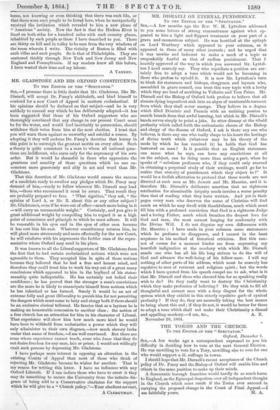MR. DISRAELI ON ETERNAL PUNISH.M.ENT. To THE EDITOR OF THE
"SPECTATOR." SIR,-A few months ago the Rev. W. H. Lyttelton addressed to you some letters of strong remonstrance against what ap-
peared to him a light and flippant treatment on your part of a grave and momentous subject. He was horrified at the epitaph
on Lord Westbury which appeared in your columns, as it appeared in those of many other journals ; and he urged that it was unwise and indecent to make a mock of a topic so unspeakably fearful as that of endless punishment. That I heartily approved of the way in which you answered Mr. Lyttel- ton I need scarcely say. They who repudiate a position are cer- tainly free to adopt a tone which would not be becoming in those who profess to uphold it. It is now Mr. Lyttelton's turn to blush for statesmen and bishops, clergymen and laymen who, assembled in grave council, can treat this very topic with a levity which they are fond of ascribing to Voltaire and Tom Paine. Mr. Disraeli and the Bishop of Oxford both profess to believe that all sinners dying impenitent sink into an abyss of unutterable torment from which they shall never emerge. They believe in a dogma
which filled Dominic and Francis with an untiring passion to snatch brands from that awful burning, but which in Mr. Disraeli's hands serves simply to point a joke. In utter dismay at the ribald profanity which called forth the enthusiastic cheers of the Bishop and clergy of the diocese of Oxford, I ask is there' any one who believes, is there any one who really clasps to his heart the heritage of divine truth which (whatever may be his theory of the mode by which he has received it) he holds that God has bestowed on man? Is it possible that an English statesman can mean what he says, can have any convictions at all on the subject, can be doing more than acting a part, when he speaks of "nebulous professors who, if they could only succeed
in obtaining a perpetual study of their writings, would go far to realize that eternity of punishment which they object to ?" It
would be a foolish affectation to pretend that these words are not directed at such men as Mr. Jowett and Mr. Maurice, and it is therefore Mr. Disraeli's deliberate assertion that no righteous retribution for abominable iniquity needs involve a worse penalty than that of reading what they have written. And yet in their pages every man who deserves the name of Christian will find much on which he may dwell with thankfulness, much which must
fill him with a profound conviction that God is a righteous Judge and a loving Father, much which breathes the deepest love for
God and man, the most earnest longing for conformity with the Divine Will. I do not disguise my own differences with Mr. Maurice ; I have made in your columns some statements which he professes to disapprove, and I cannot in the least acquiesce in his method of historical criticism. But this can- not of course for a moment hinder me from expressing my heartfelt indignation at the mockery with which Mr. Disraeli assails one who has all his life long striven to do the will of God and advance the well-being of his fellow-men. I will say nothing of other parts of his address, which must be scarcely less repulsive to men of reverent and religious spirit ; but the words which I have quoted from his speech compel me to ask, what is it that Mr. Disraeli and those who cheered him for so speaking really wish to do? Do they really want to destroy the Christianity which they make profession of believing ? Do they wish to fill all thoughtful and earnest men with a deep disgust for the whole system which they exhibit in this utterly repulsive garb of cynical profanity ? If they do, they are assuredly taking the best means to bring about this end ; if they do not, it would be better for them to adopt a tone which shall not make their Christianity a dismal






























 Previous page
Previous page